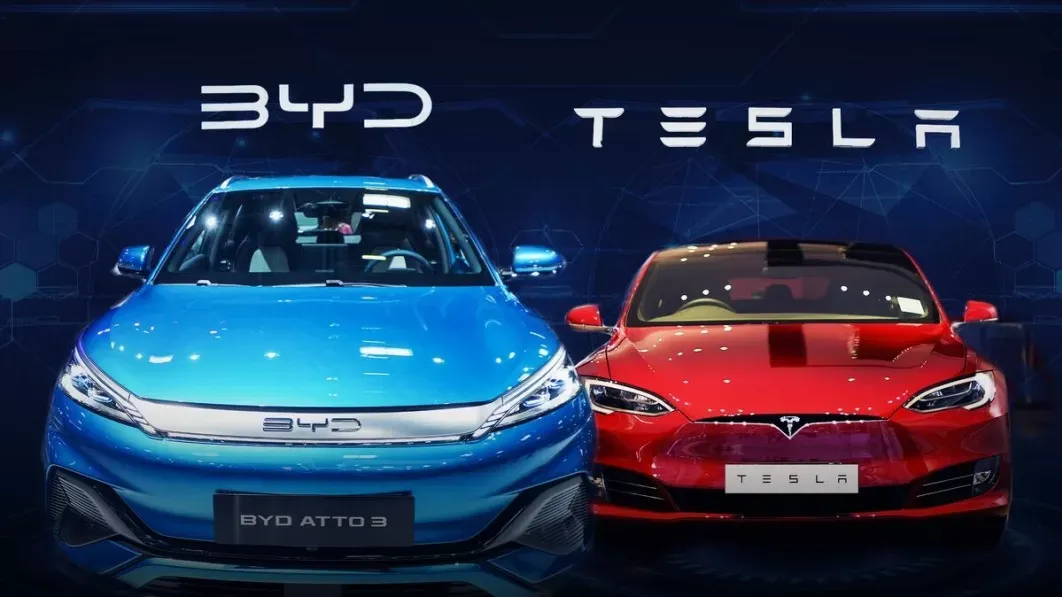BYD Widens EV Lead Over Tesla in Singapore: A Comprehensive Look at Southeast Asia's EV Market Dynamics
As the world shifts to sustainable transportation, EV manufacturers are fiercely competing for dominance in key markets
As the world moves towards sustainable transportation, electric vehicle (EV) manufacturers are fiercely competing for dominance in key markets. In Southeast Asia, Chinese automaker BYD is making significant strides, particularly in Singapore, where it is outpacing Tesla. This article delves into the stats of both companies in the region, explores their market capitalization in various Southeast Asian countries, and compares their EV offerings.
BYD vs. Tesla: A Southeast Asian Showdown
BYD's Growing Presence: BYD, short for "Build Your Dreams," has rapidly expanded its footprint in Southeast Asia. The company's strategy focuses on affordability, local partnerships, and a diverse range of EV models tailored to the region's needs. In Singapore, BYD has seen its sales surge, thanks to a combination of competitive pricing, government incentives, and an expanding charging infrastructure.
Tesla's Position: Tesla, known for its high-performance EVs and cutting-edge technology, entered the Southeast Asian market with high expectations. However, its premium pricing and limited local manufacturing have posed challenges. In Singapore, while Tesla remains a strong contender, it is facing stiff competition from BYD's more affordable and versatile models.
Market Capitalization Comparison:
Singapore:
- BYD: BYD's market cap in Singapore has grown significantly, bolstered by strong sales and strategic partnerships. As of the latest data, BYD's market cap in Singapore is approximately SGD 15 billion.
- Tesla: Tesla's market cap in Singapore stands at around SGD 12 billion, reflecting its strong brand presence but also highlighting the challenges it faces in maintaining its market share against BYD.
Malaysia:
- BYD: In Malaysia, BYD's market cap is approximately MYR 8 billion. The company's focus on affordable EVs has resonated well with Malaysian consumers.
- Tesla: Tesla's market cap in Malaysia is around MYR 6 billion. While Tesla's brand allure is strong, BYD's cost-effective models are gaining traction.
Thailand:
- BYD: BYD's market cap in Thailand is about THB 10 billion, driven by its collaborations with local companies and government support for EV adoption.
- Tesla: Tesla's market cap in Thailand is around THB 9 billion, indicating its solid presence but also the increasing competition from BYD.
Indonesia:
- BYD: In Indonesia, BYD's market cap is approximately IDR 20 trillion. The large population and growing interest in EVs have fueled BYD's rapid expansion.
- Tesla: Tesla's market cap in Indonesia stands at around IDR 18 trillion. Despite a strong initial entry, Tesla is facing pressure from BYD's aggressive market strategies.
Vietnam:
- BYD: BYD's market cap in Vietnam is about VND 12 trillion, reflecting its successful market penetration and consumer acceptance.
- Tesla: Tesla's market cap in Vietnam is around VND 10 trillion, showcasing its brand strength but also the competitive landscape.
Comparing EV Offerings:
BYD: BYD offers a diverse range of EVs, from compact cars to buses and trucks, catering to various market segments. The company's focus on affordability, coupled with advancements in battery technology, has made its EVs appealing to Southeast Asian consumers. Models like the BYD e6 and Tang SUV have gained popularity for their balance of price, range, and features.
Tesla: Tesla's lineup in Southeast Asia includes the Model S, Model 3, Model X, and Model Y. Known for their high performance, cutting-edge technology, and autonomous driving features, Tesla's EVs cater to the premium segment. However, the higher price points and limited local production have restricted Tesla's market penetration compared to BYD.
The competition between BYD and Tesla in Southeast Asia highlights the diverse strategies of these leading EV manufacturers. BYD's emphasis on affordability and local partnerships has enabled it to capture significant market share, particularly in Singapore. Tesla, while maintaining a strong brand presence, faces challenges in matching BYD's appeal to cost-conscious consumers. As the EV market in Southeast Asia continues to grow, the dynamics between these two giants will shape the future of sustainable transportation in the region.






